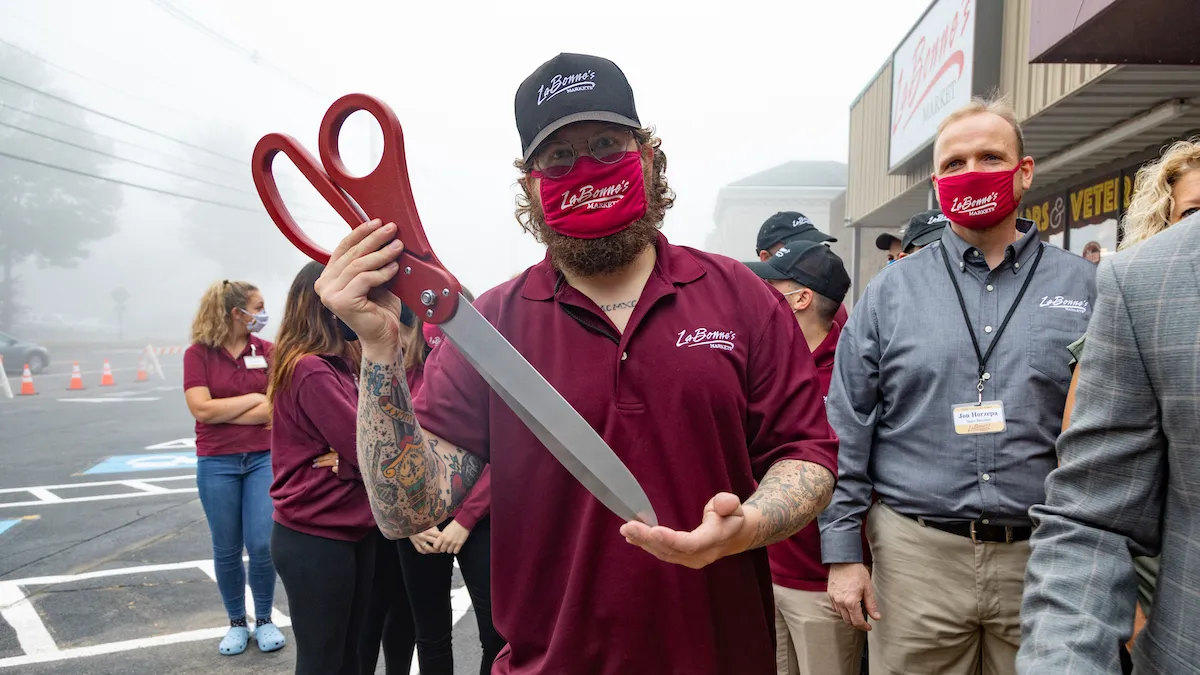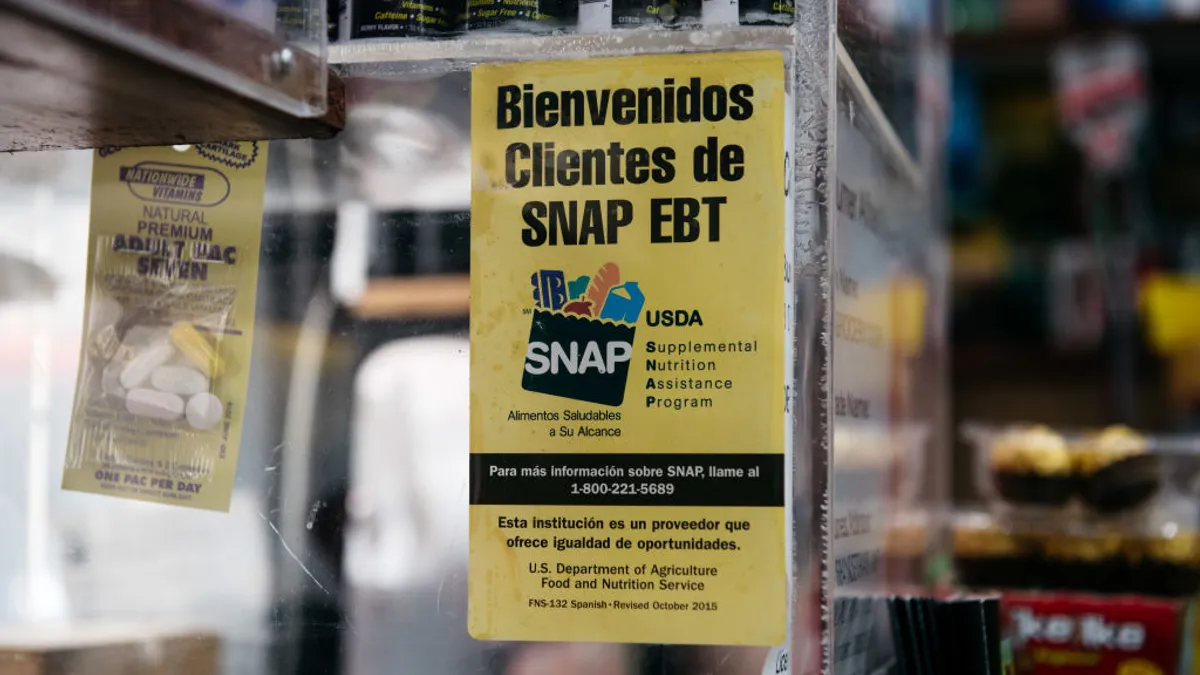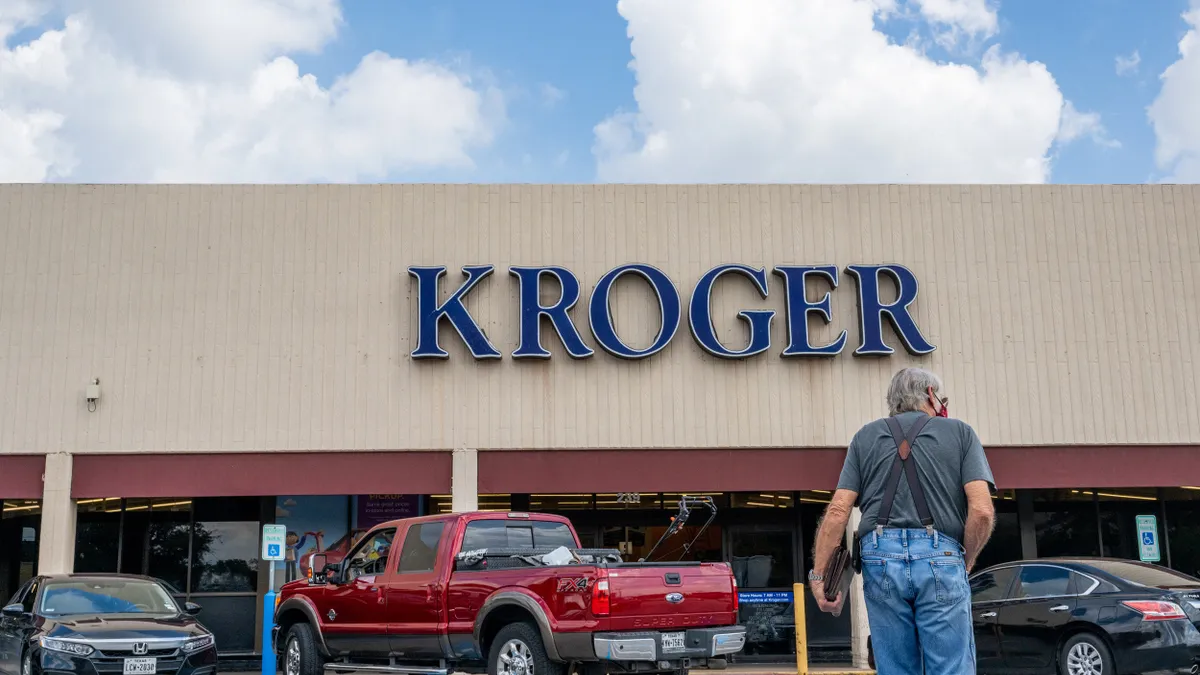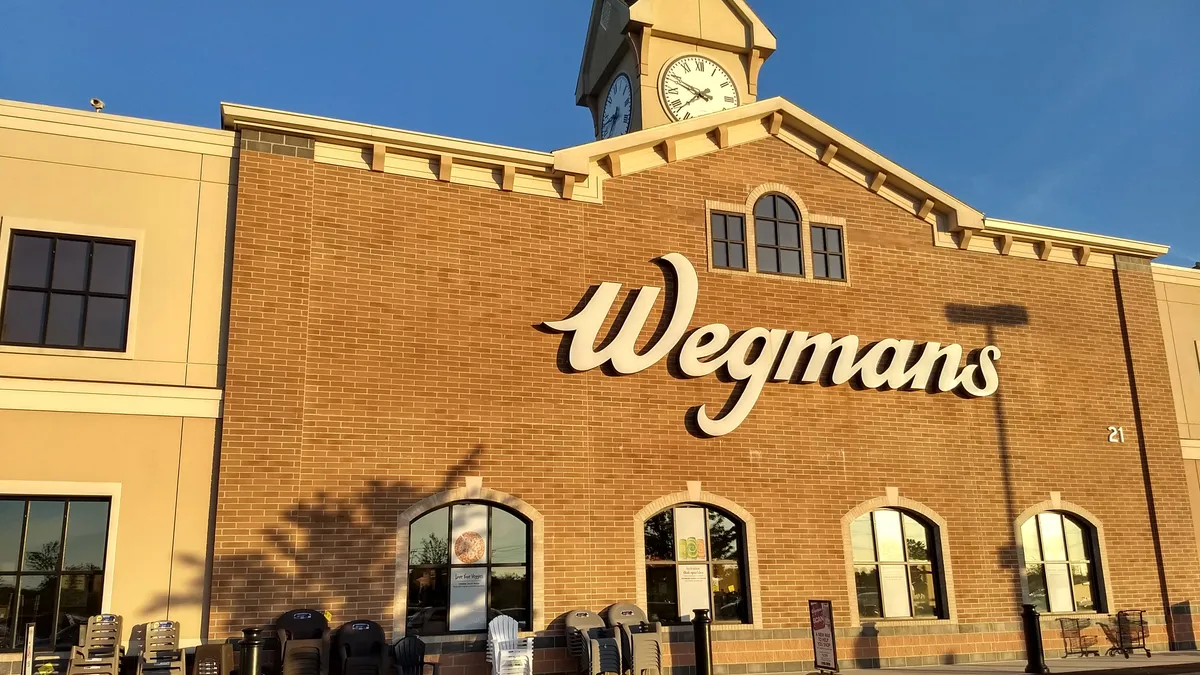When the pandemic began taking over life in the United States in March, Connecticut grocer Bob LaBonne Jr. quickly clamped down on access to his four supermarkets in order to prevent the virus from spreading on his watch.
He took extraordinary safety measures, including requiring everyone walking into his stores to submit to a temperature check and barring entry to anyone with a fever, without exception. That vigilance and the associated extra labor expenses have paid off, LaBonne said: To his knowledge, none of his employees or their family members have tested positive for COVID-19, and LaBonne is determined to maintain that record.
But with life in the communities where LaBonne’s Markets operates a little calmer than it was a few months ago, LaBonne decided it would be OK to bring a little fun back into his business. Last Saturday, he threw a grand opening party for his newest location, a store in Prospect, Connecticut, that LaBonne’s Markets acquired last December and had been operating under its former name, Oliver's Supermarket, while converting it to the LaBonne’s brand.
The event featured traditional attractions like food vendors, a fire engine and live musical entertainment in the store’s parking lot, along with in-store games and giveaways, according to an advertisement on Facebook.
LaBonne, whose family has been in the grocery business for more than 120 years, also operates stores in Salisbury, Watertown and Woodbury, Connecticut.
“We’re not just a grocery store, we’re a community partner,” said LaBonne, adding that with events like carnivals and fairs having been canceled for months, he felt people would appreciate the chance to enjoy an outdoor event and thought it would be appropriate for him to host it.
Opening as safely as possible
However, while the advertisement noted that face coverings and social distancing would be required, not everyone who attended complied with that stipulation. Pictures taken at the event show a small number of people standing close to one another or not wearing masks outside.
Grocers have been grappling with how to safely hold gatherings at their stores during the pandemic. Wegmans said in May it would stop holding events to mark the opening of new stores or even announcing opening dates, but reversed course in July, announcing in a July 15 Twitter post that it would open a new store in West Cary, North Carolina, two weeks later. "We couldn't wait any longer," the grocer tweeted.
In August, Lidl, which opened a new store in Suwanee, Georgia, in May without fanfare, said it would host a grand opening event featuring a pop-up farmers market at its new store in Alexandria, Virginia, in early September.
Part of the push to change store openings reflects shoppers' increasing comfort level, with more people heading back to stores each month since the pandemic first hit the U.S. It also reflects a growing understanding of how the virus spreads, with health experts noting that outdoor spaces, where opening events at LaBonne's and other retailers have unfolded, are less risky than indoor spaces.
LaBonne said he felt the event at his store was as safe as he could reasonably expect it to be. Even as he offered up a carnival-like atmosphere outside the store, he said he refused to compromise on safety inside the refreshed supermarket. Anyone with a mask was welcome at the festivities, but people entering the store still had to undergo the same temperature checks LaBonne has insisted on for months.
“Our number one priority was to keep our associates and their families safe, our customers and our community safe, and if we do some sales and profits, that’s a nice aftereffect,” said LaBonne.
Staff sharply limited occupancy of the 13,000-square-foot supermarket, which had been operating at reduced capacity for months, although LaBonne decided to increase from 35 to 50 the number of customers allowed inside at the store at a single time for the day. To avoid crowding, he brought in employees from his other stores, beefing up stations like checkout and deli to help move shoppers through quickly.
“We knew we would be able to get people out faster so there wouldn’t be lingering in the store,” LaBonne said. “Knowing we were turning the dials faster, I wasn’t as worried about having 20 people in line. One customer was getting waited on by two people at the deli to get them through the store faster.”
Although the event was intended in part to generate extra sales and attract new customers, sales at the newly refreshed store were about 30% higher on Sunday than they were the day of the celebration, LaBonne said.
“I think there was a percentage of our customers that said, ‘You know what? I think it might be a little crazy there with a carnival atmosphere, so I’ll wait until Sunday,’ and the numbers reflected that,” he said.
LaBonne added that beyond marking the launch of the store under his brand, the celebration reflected a new beginning for his grocery business after months of difficulty. He noted that for the first time since the pandemic began, the chain has been able to run advertised specials on meat and other products that have been hard to obtain in sufficient quantities to satisfy demand.
“We felt bad for our customers during the peak of the COVID that we weren’t able to offer them aggressive specials because we were just so restricted with what case counts we could bring in,” said LaBonne. “That was a driving force for us in deciding to do the grand opening.”
Showing off new store features
For LaBonne’s, the rebranded store represents a key milestone for other reasons, too. The new location sports a number of new features that reflect changes the grocer has seen as a result of the pandemic, including expanded organic and refrigerated produce sections, service meat and seafood departments, and an expanded kitchen. LaBonne's also began accepting online orders at the store and added home delivery service.
LaBonne also invested in more aesthetic improvements at the store than he had originally planned. Rather than just a refreshed paint job and a new sign, the store sports an entirely new decor package that LaBonne said he intends to replicate at his other three stores over the next couple years.
“It’s a better offering, and it’s a different store than it was in April,” when LaBonne had originally thought he’d have finished transitioning it to his brand, he said.
In a significant departure from the way he has run stores in the past, LaBonne said he decided to dedicate space that had been used for paper goods to products that have resonated with shoppers especially well during the pandemic. For example, beer sales at the new store have recently been 10 times higher than they were when LaBonne purchased the store last year.
“This is another side effect of COVID. Because the paper aisle has been decimated for six months, we cut paper back because you’re lucky if you get 40 cases a week,” LaBonne said. With consumers getting used to a limited selection of products that formerly had been available in a wide variety, “we ended up doing a whole store reset … the center of the store has been shrinking, so why not give the people more of what they’re voting for? Being unique and different is better than having a sixty-second flavor of cat food.”
In the end, LaBonne said, he has learned that as a grocer, it is essential to be agile and resolute to keep pace with the unexpected changes that have been thrust on his business by the pandemic.
“We prioritize and execute,” he said. “We began seeing there was no paper, and asked what’s the priority. We have to put other stuff in that category and use that space, because every inch of the store is paying rent.”





















